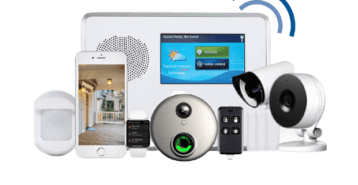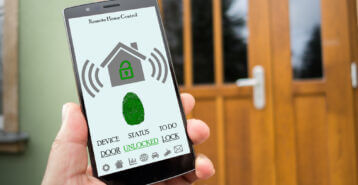In a world filled with wireless security systems, the advantages of wired home security systems can easily be overlooked. While wireless options offer features like battery life and cloud storage, wired systems provide their own reliable and advanced security solutions.
One major benefit of wired home security systems is that they don’t require cloud storage. This means you won’t have to worry about costly monthly fees for saving your footage. Plus, wired systems won’t run out of battery, keeping your home safe and secure at all times. Many options are also DIY-friendly, making installation simple.
As you prioritize safety and security for your family, consider whether a wired home security system is the right choice for your needs.
What is a Wired Home Security System?
Wired systems use physical wires throughout your home to connect cameras and sensors. Wired home security systems work by tapping into your home’s electricity and landline phone or ethernet cable. Installation is more involved and, if you move from your home, you’ll likely leave the security system behind for the new owner.
Wired cameras communicate through wires. They record and save footage digitally either to a local storage option or online through an ethernet cable.
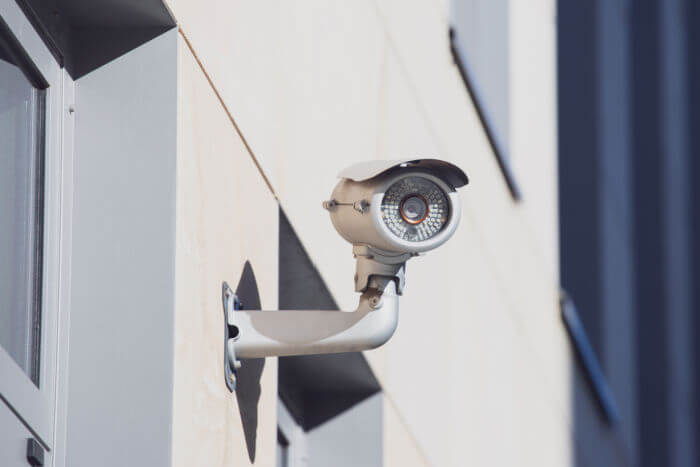
Why Choose a Wired System Over a Wireless System?
If reliability is your priority, a wired system is the best choice. These systems continue to function even if your home’s Wi-Fi goes down, as they connect directly to your power supply. While you don’t need batteries, having a backup for power outages is advisable. Because cameras are hard-wired to your internet connection, they can communicate without Wi-Fi.
Wired home security systems also record and save footage locally. This eliminates worries about running out of cloud storage, allowing you to keep essential clips without incurring costly monthly fees.
Additionally, wired systems often include professional monitoring. When a threat is detected, your provider can alert you and law enforcement quickly. This level of integration is less common with wireless options.
Can You Install Them Yourself?
Depending on your system choice, you might be able to install a wired security system yourself. Many systems include mounting hardware and detailed instructions. While this may take longer than a wireless setup, it can save you money.
If you’re unsure about installation or accessing your home’s power, professionals are available for a nominal fee. Most wired system providers offer a list of recommended installers.
Wireless vs. Wired Home Security Systems
Wired systems may not look as flashy as wireless ones, but they can integrate well with your smart home devices, including Wi-Fi. Modern wired systems get their power from electricity. They don’t depend on Wi-Fi to record footage or communicate with other cameras. With dedicated apps, these systems can alert you to captured events. Even if your Wi-Fi goes down, your wired system continues to work reliably. You can also choose a wired system that supports app notifications and connects to your home hub for better automation.
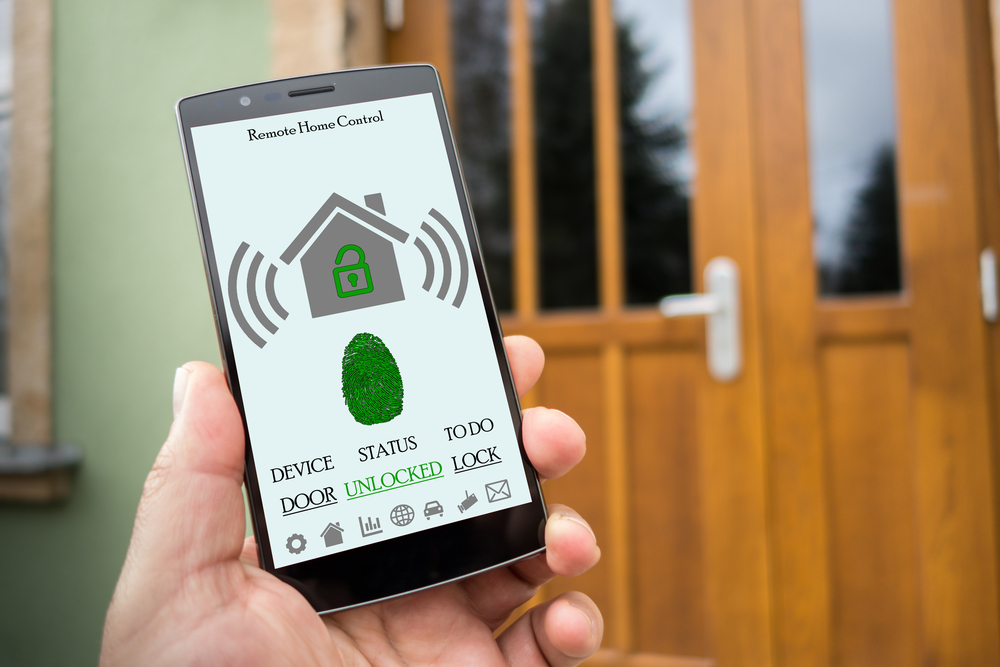
On the other hand, wireless systems rely on battery power and Wi-Fi for communication between cameras, control panels, and apps. They don’t have visible wires, which allows for more flexibility in positioning and installation. Many users like the convenience of moving the system if they change homes.
However, wireless cameras communicate through Wi-Fi or radio frequencies, which can easily be disrupted. They rely on wireless connections to store and transmit footage. Although wireless cameras do not need Ethernet cables, they require a strong Wi-Fi signal, which can limit their effectiveness. Additionally, radio frequencies can experience disruptions, affecting the reliability of wireless systems.
Pros and Cons of a Wired Home Security System
Wired home security systems offer a reliable, long-term solution for safeguarding your property. However, they come with their own set of advantages and disadvantages. Let’s break down the pros and cons to help you make an informed decision.
-
Pros
- Harder to hack.
- Secure power access covering large areas.
- No cloud storage payments.
-
Cons
- Requires professional installation.
- Hard to adjust and not portable.
- Higher upfront cost.
Pros of Wired Home Security Systems
- Harder to Hack: Wired systems are generally more secure against hacking. They do not rely on Wi-Fi, making them less vulnerable to remote attacks. This feature makes them a safer option for those concerned about cybersecurity.
- Secure Power Access Covering Large Areas: Wired systems connect directly to your home’s power supply. You don’t have to worry about battery life or recharging devices. This makes them ideal for larger properties where consistent power is essential for security.
- No Cloud Storage Payments: With a wired system, you typically avoid cloud storage fees. Recordings are stored locally, often on a DVR. This can help reduce long-term costs related to storing and accessing video footage.
Cons of Wired Home Security Systems
- Requires Professional Installation: One major drawback is that wired systems usually need professional installation. Running wires through walls and ceilings can be complex and time-consuming, adding to the overall cost and inconvenience.
- Hard to Adjust and Not Portable: Once installed, wired systems are challenging to adjust or relocate. This lack of flexibility can be a downside if you plan to move or frequently change your home’s layout.
- Higher Upfront Cost: The initial costs for wired systems are typically higher than for wireless options. The expenses for equipment and professional installation can add up. However, this may be offset by not having monthly fees for cloud storage or monitoring.
In summary, wired security systems offer excellent security and reliability. However, they come with higher installation costs and limited flexibility. Depending on your needs, these trade-offs may or may not make wired systems the right choice for your home.
Benefits of Wired Home Security Systems
There are a lot of positive attributes of a wired home security system that its wireless counterparts simply don’t offer. Here’s a look at some of the biggest factors.
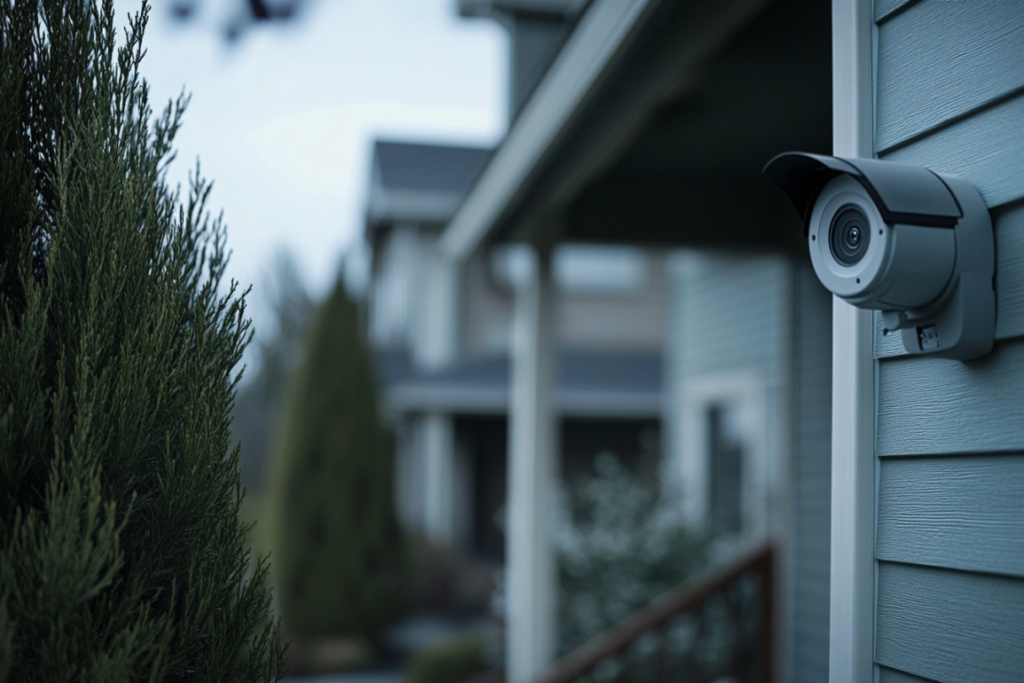
- Reliability: Don’t worry about spotty Wi-Fi or interference from other devices in your home getting in the way of your security system’s performance. You’ll never have to replace another battery either. Wired systems are more reliable because they are hardwired into your home’s electricity and internet.
- Cost: Avoid monthly payments for cloud storage and have peace of mind knowing your footage is available.
- Hacking: Unlike a wireless system, wired systems are not susceptible to hacking. A hacker can easily get into your wireless system through the internet, but a wired system would need to be physically hacked.
- Covers larger areas: Unlike wireless systems, which need to be in reach of your Wi-Fi signal, wired systems can span larger homes and even multiple buildings a property because everything is hardwired together. It’s a big consideration to make if you have a sprawling floor plan, multiple levels, or other structures you want to monitor, such as a garage or shed.
How Much Does a Wired Security Camera System Cost?
A wired security camera system typically costs a bit more than your average wireless system because there’s more hardware involved in their installation. Many wireless systems allow you to purchase hubs and cameras individually. Wired systems are more robust and comprehensive. You can expect to spend between $150 and $2,500 for a wired system depending on your needs.
Installation is often included with these pricier options. If you decide to pay your own professional to install the system, however, the costs can range from $150 to $200 per camera. It’s important to note that wired systems often require cutting into walls and floors, making the installation process more time-consuming and, consequently, more costly compared to a wireless system.
Wired systems also come with certain monthly fees to consider. The added benefit of professional monitoring of your system, often considered the biggest perk of a wired system, ranges from $100 to $600 per year. When comparing this to the cost of cloud storage for a wireless security system, the expenses are relatively comparable. It’s worth noting that if you choose a self-monitored wired system, you can avoid monthly fees altogether.
However, homeowners can have peace of mind by having a professional monitor their property, making sure the system is functioning, and reporting any suspicious activity promptly. This added level of security provides an extra level of security for homeowners.
Best Wired Home Security Camera Systems
Several brands offer reliable wired home security systems. Here’s a look at some of the most well-known names in the industry.
ADT
With over 140 years of experience, ADT has consistently updated its technology to provide top-notch home security solutions. While known primarily for wired and monitored systems, ADT also offers digital integrations that give your security system many wireless features. These include user-friendly apps and home hub capabilities. In addition to cameras, ADT provides sensors for doors and windows and detectors for fires and carbon monoxide leaks.
Brinks
Brinks has been a leader in the security industry for over 150 years. They offer monitoring systems that ensure fast response times. Certain packages come with touch-screen integrations for a better user experience. Brinks also syncs easily with Google and Amazon home hubs, making it a seamless part of your smart home ecosystem.
Lorex
Lorex offers flexibility with both wired and wireless camera options. One key advantage is that these cameras can work together within the same system. Many Lorex systems are designed to be DIY-friendly, allowing homeowners to set up and customize their security according to their specific needs.
For a more in-depth look at the most popular brand of wired home security systems and a comparison of your options,
Installing Your Wired Home Security System
Ready to tear into walls and floors? A wired home security system usually requires a bit more elbow grease than your standard wireless option. You’ll be tapping into your home’s electrical and internet sources, and the most aesthetically pleasing route will be to hide the wires from view behind walls and floors.
Many companies will install the system for you, included as part of your initial cost and monthly payment for monitored security. Of course, plenty of DIY videos are out there if you’d rather handle the job yourself.
However, while a DIY installation is possible, we recommend talking with a professional first for guidance. It could be easier and surprisingly affordable to have your system installed by a pro.
Compare top-rated home security pros in your area.
Read real homeowner reviews, explore qualifications, and view promotions. Modernize makes it easy to browse professionals and find one that will be perfect for your project.



